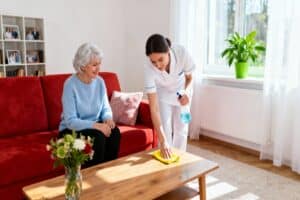Summer hot weather in Ontario starts earlier each year. It stretches into late September and even early October in recent years, and seniors need to stay protected against the hazards of the harsh sun. Aside from the hot weather extending into what used to be the fall, the sun has become a lot more unforgiving and can cause significant skin damage quickly. Problems like heat stroke and heat exhaustion can be a real problem for seniors, as they are more susceptible to extreme heat and sudden temperature swings. Stroke Recovery Care
There is concern about how existing medical conditions and medications can compromise the body’s ability to adjust to excessive heat.
Health Concerns Caused by Extreme Heat
There are several health conditions and ailments for seniors to be concerned about in the sweltering summer heat. Knowing the dangers of these conditions, as well as the symptoms and warning signs to look out for can help prevent problems before they start.
Some heat-related conditions for seniors to be vigilant about are:
- Dehydration
- Heat exhaustion
- Heat stroke
- Heat syncope
Dehydration
Dehydration is a fairly common problem for older adults in the summer, which is caused when the body loses more fluids than it is taking in. If your body lacks sufficient water and other essential fluids, it is no longer able to perform its required functions properly. If these fluids are not quickly replaced, dehydration is the likely result.
Symptoms
Some warning signs can help you recognize the onset of dehydration and may include:
- Weakness
- Headache
- Dizziness
- Fatigue
- Muscle cramps
- Dry mouth
- Confusion
If you are experiencing any of these symptoms, you should get out of the sun and drink some water immediately.
Heat Exhaustion
More serious cases of dehydration can easily lead to heat exhaustion if not urgently attended, accompanied by physical activity that makes it difficult for the body to cool itself adequately.
Symptoms
Warning signs of heat exhaustion include:
- Dehydration symptoms
- Cold or clammy skin
- Paleness
- Excessive sweating
- No sweating due to lack of fluid for perspiration
- Change in pulse or breathing
- Nausea or vomiting
- Passing out
Heat Stroke
Heat stroke is yet one more step up in severity from heat exhaustion. The heat stroke symptoms are similar to those of heat exhaustion, with the addition of an alarming rise in body temperature.
Symptoms
Some signs of heat stroke are:
- Same symptoms of heat exhaustion
- Sunburned or red skin that is hot to the touch
- Body temperature of 103 or more
- Loss of consciousness
Heat Syncope
Heat syncope is often a symptom of heat exhaustion or heat stroke. It is characterized by fainting or passing out caused by the sun or intense heat.

Health conditions that may contribute to heat problems
Existing health conditions can sometimes trigger or intensify the threatening effects of excessive heat and the harsh sun.
Seniors with the following conditions may be at a greater risk of heat exhaustion or heat stroke:
- High blood pressure
- Poor circulation
- Type 2 diabetes
- Cardiovascular disease
- Mental illness
Older adults with any of these conditions should be extra careful when making a trip out in the sun. Anyone experiencing symptoms of heat stroke should get out of the sun, put their feet up, and drink plenty of fluids.
Avoiding Heat Stroke
There are many safety tips seniors can follow to avoid sunstroke and the ill effects of the summer heat.
Summer safety tips include:
- Stay hydrated
- Avoid peak sun hours
- Wear appropriate clothing
- Apply sunscreen
- Take advantage of air-con
Stay Hydrated
One of the best ways to avoid health problems in the heat is to stay hydrated. It is recommended that all adults, especially seniors, consume at least 2 litres of water every day to stay healthy and hydrated.
This is based on the 8X8 rule; 8 servings of an 8-ounce glass of water daily.
As we get older, we are no longer able to conserve water as effectively, so seniors need to be extra conscientious. Avoid caffeine and alcohol, as they contribute to dehydration. Additional water should be consumed if physical exercise is involved.
Avoid Peak Sun Hours
Late morning to late afternoon is when the sun is at its strongest. Only go out during these times if absolutely necessary.
Appropriate Clothing
Light-coloured and loose-fitting clothes are the most practical for hot summer days. Don’t forget a hat and sunglasses to protect your head and face.
Apply Sunscreen
Always apply sunscreen to exposed skin when heading outside in the summer. The sun can even do damage when the weather is overcast. SPF of at least 50 is highly recommended.
Air Conditioning
Pop into the library or an air-conditioned store to cool down along your travels to catch a break from the relentless heat.
If your parent or loved one needs ongoing care at home after a stroke, the healthcare team at Promyse is there to help. Our Personal Support Workers deliver high-quality care. We provide care according to the needs of your parent – from daily visits to around-the-clock care.



